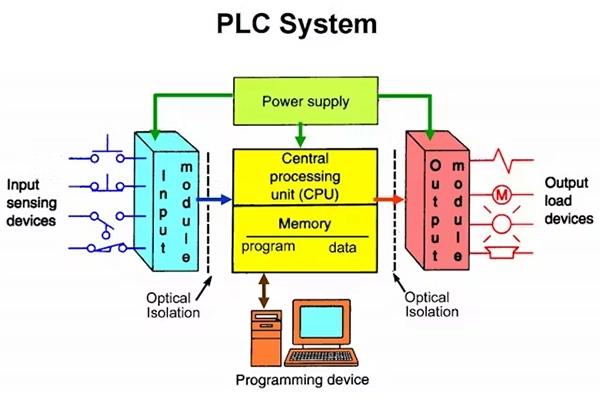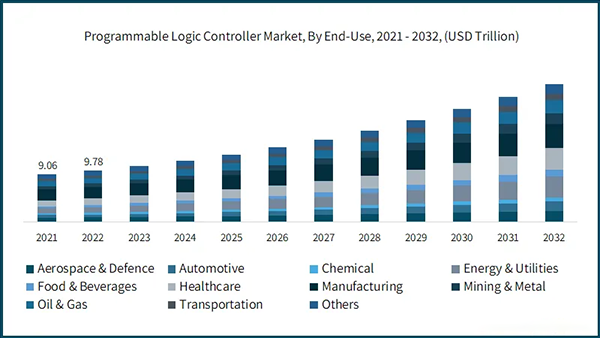The Benefits of Using Programmable Logic Controllers in Industrial Automation
In the fast-paced industrial world, where literally every project requires efficiency and precision at its core, Programmable Logic Controller (PLC) systems have been making some significant changes in the market.
It is a unique technology leveraged by industries to control and monitor their work., not only does the system ensure smooth and efficient manufacturing but it also helps automate the whole process.
So, in this read, I will be uncovering how PLCs have been helping factories achieve their best in the manufacturing field along with the benefits that are driving the whole automation process. Also, learn about Tech Solutions for Construction Industry by reading this article.
What is a Programmable Logic Controller (PLC)?
A Programmable Logic Controller, or PLC, is a digital computer often used for automating the industrial process. The system utilizes programmable memory to store instructions and automate complex industrial tasks.
PLCs are typically used for a range of purposes, such as to control machines, robotic devices, and much more. It basically receives the information from the sensors and processes that data based on some pre-programmed parameters to come to its final output. So, here are some of the specific examples where a PLC system can be leveraged.
- Controlling the lifts
- Managing all the lights in the system.
- Processing some industrial work like cutting glass and paper.
- Preventing the blowouts in oil and gas refineries.
- And, monitoring all the security cameras in the industry.

Key Benefits of Using PLCs
Now that you have a little background on what a PLC system is all about, let’s dive a bit deeper into the key benefits of leveraging PLCs into the industrial process.
A Significant Boom In The Business Productivity
PLC systems are known best for speeding up the whole production process. It utilizes some solid-state programming for processing the inputs and generating outputs accordingly, which is probably their biggest advantage against traditional relay-based systems.
This also helps in automating the repetitive tasks that otherwise require a manual intervention. For instance, in a manufacturing facility where moving products through different stages of production is essential. PLCs can control the whole conveyor belt which not only minimizes downtime but also speeds up business productivity.
Unparalleled Precision in Controlling The Machinery
The manufacturing process often requires executing the programmed instructions carefully with high accuracy. This is right where PLC systems come into play with very precise control over the robotics, making it an ideal choice for the large-scale automation process. By leveraging the PLC technology, industries can ensure strict quality control over their products while minimizing the potential damages.
A Flexible And Scalable Solution
PLCs can be programmed to perform a range of tasks, be it a food processing plant to solar energy management. It is a highly flexible system that can perform on both heavy-duty equipment and precise robotics.
And, other than that, it is also scalable that can be programmed and reprogrammed based on the required changes in the production process.
Minimizing The Risk of an Immediate Error
In an industrial environment, safety should always be the utmost priority. This is right where industries can leverage the Programmable Logic Controller to program it for immediate shutdowns and machine guarding during any potential error.
For instance, a PLC can detect if the machine is not working fine or if is it overheating and then immediately shut it down to reduce the risk of an immediate error.
Do You Know?
The market size of Programmable Logic Controller (PLC) systems is estimated to reach USD 15.07 Billion by 2029 with a staggering 4.23 % CAGR between 2024–2029.
Real-Time Monitoring and Control
PLCs provide real-time monitoring and control of industrial processes. They can gather data from various sensors and devices, allowing operators to monitor the performance of machinery and processes in real-time. This capability helps identify issues early and make adjustments as needed, leading to more efficient operations and reduced downtime.
Easy to Maintain
PLCs have a built-in diagnostic feature, which makes it easier to maintain any troubleshooting issue before it can cause major damage. In addition, they are often designed in a modular fashion, which allows companies to update or replace the affected section of the machine without affecting the rest of the part.
A Cost-Effective Method
PLCs are capable of automating complex tasks that otherwise need a full human intervention. This can help companies reduce their overall spending on manual labor so that they can invest that money further for expanding the existing system.

To Put It All Together
In closing, Programmable Logic Controllers (PLCs) offer numerous benefits in industrial production. And, not only does it contribute to industrial automation but also provides some real-time monitoring of integrated robotics to ensure the efficiency and precision of any project.
So, by leveraging these striking advantages of a PLC system, companies can improve their operations and stay competitive in the current industrial landscape.








